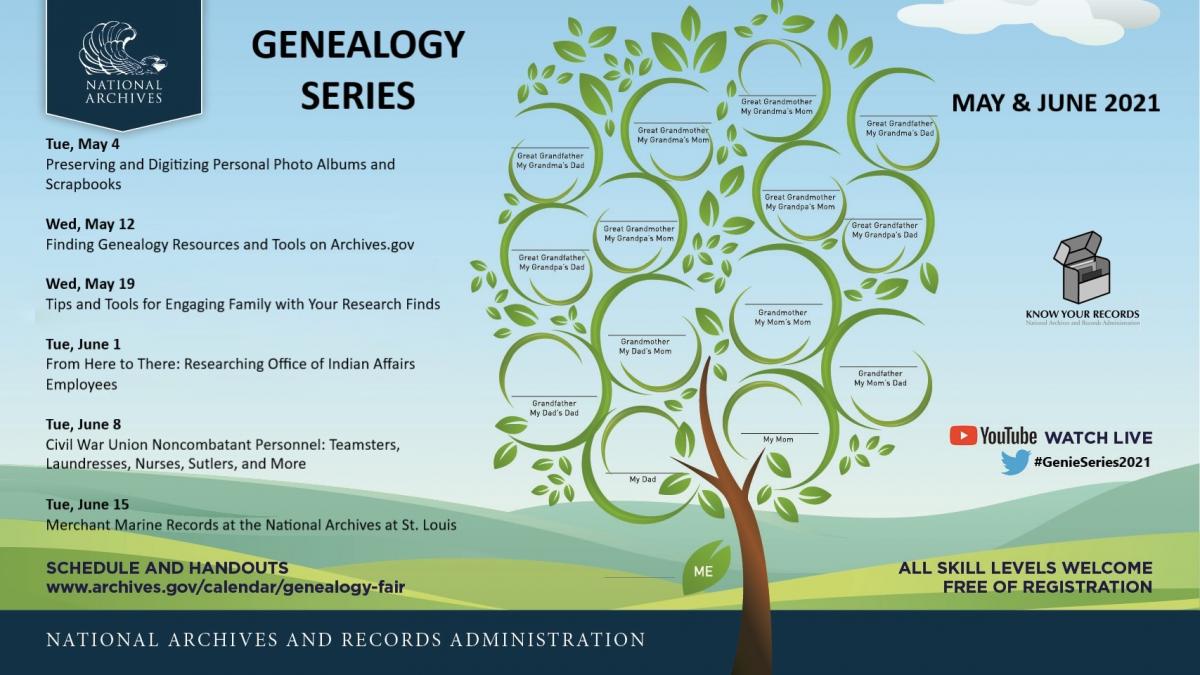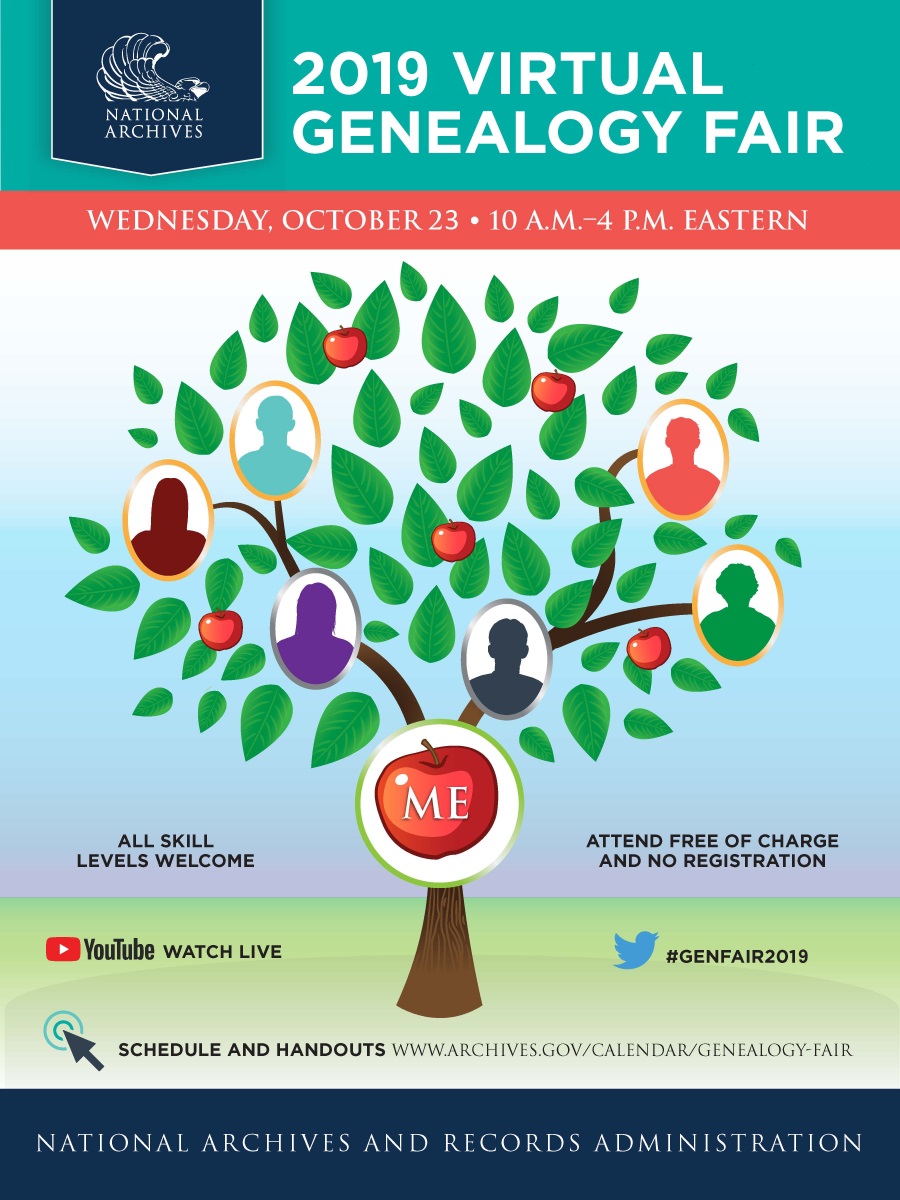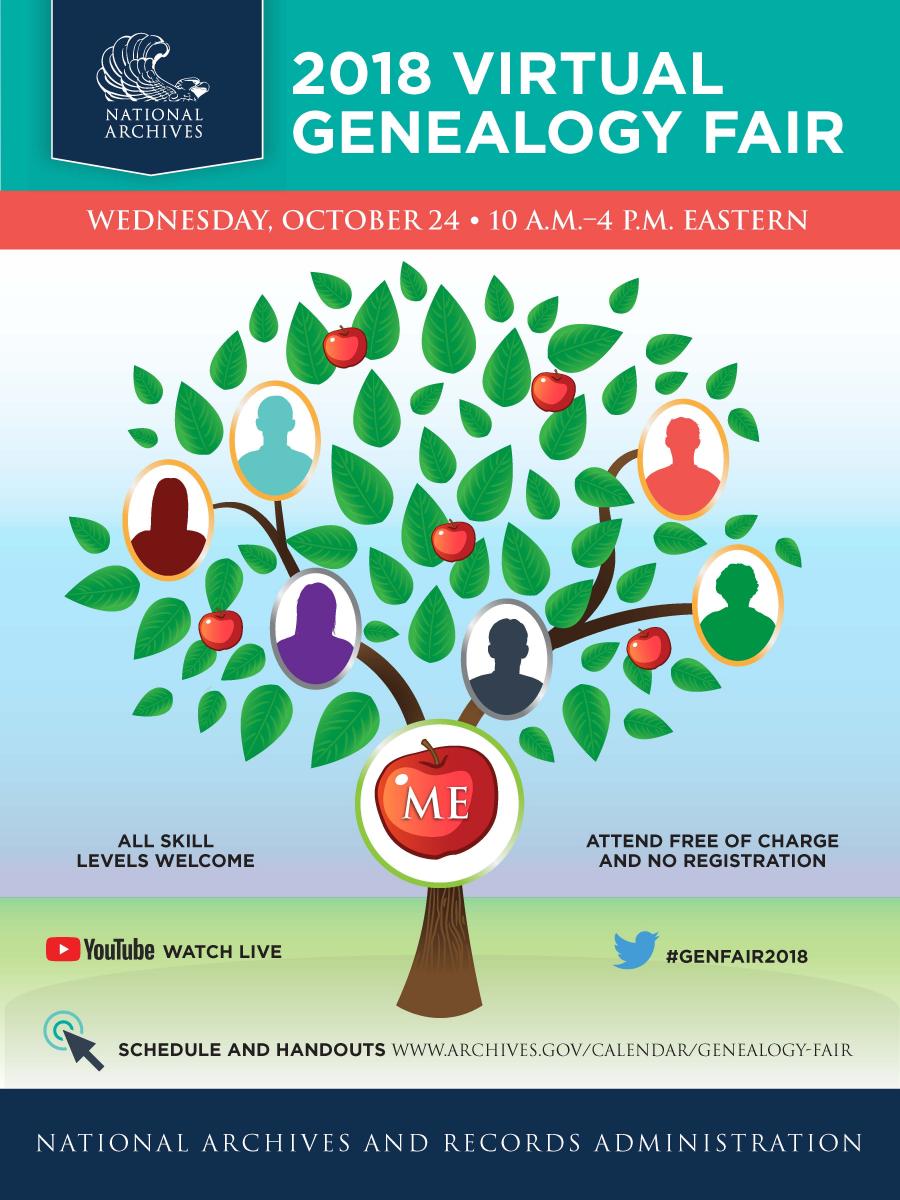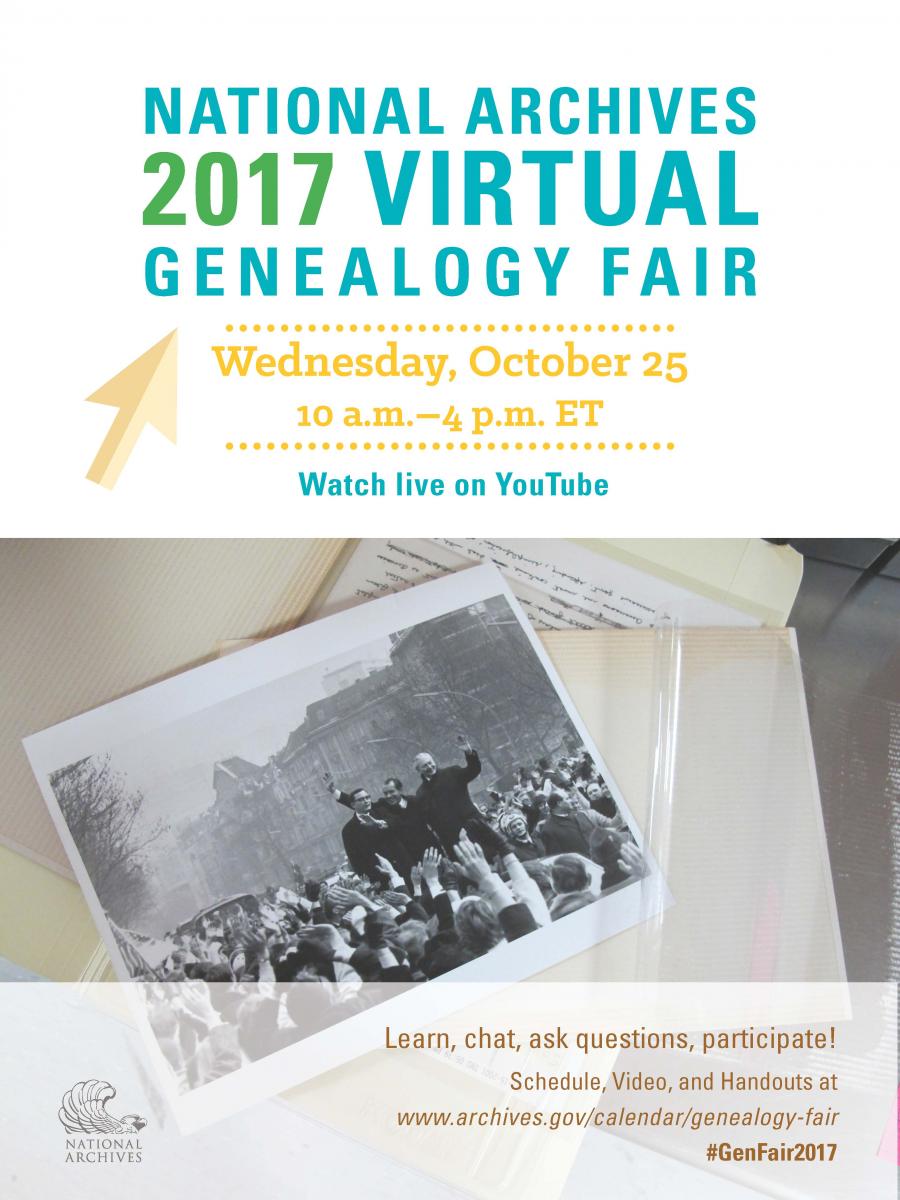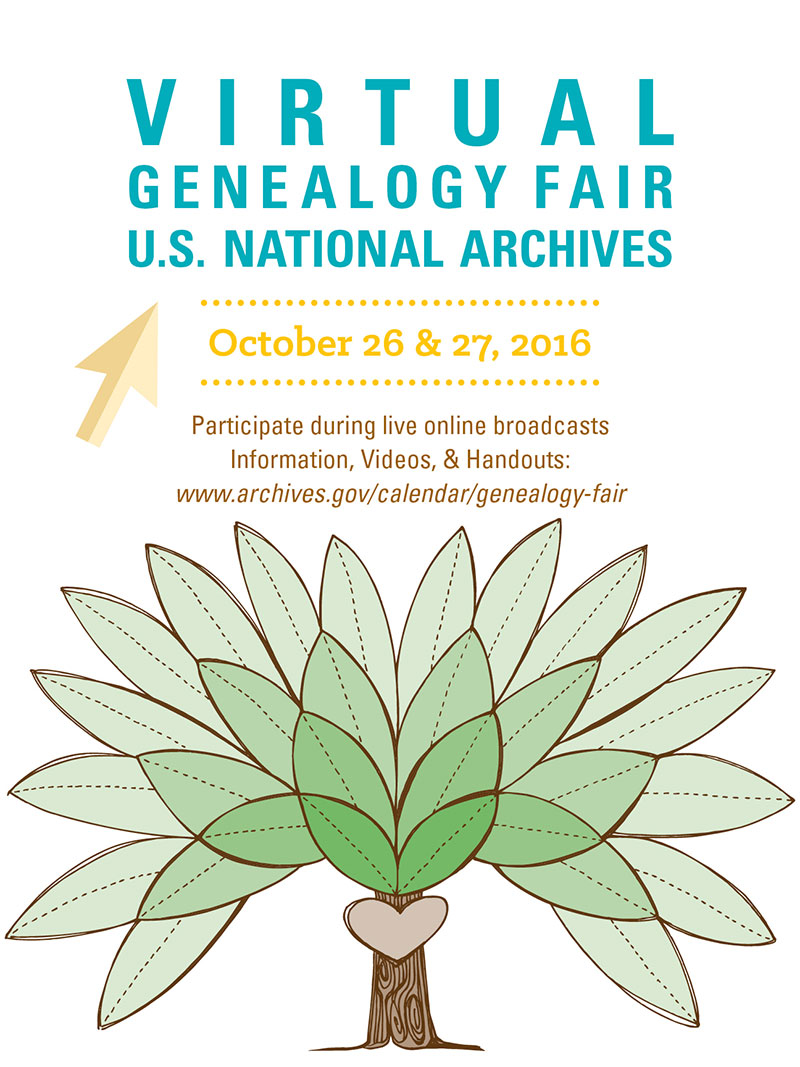
Genealogy Fair: April 19, 2006
Find an EventGenealogy Fair
Wednesday, April 19, 2006
National Archives Building, Research Center Lobby
This event was free and open to the public.
 Event Schedule
Event Schedule
Match your interests with our itinerary by choosing from three session topics, or attend an ongoing demonstration.
Topic tracks:
- General Genealogy
- D.C. Genealogy Records
- D.C.—The City
9:15-10:00 a.m.
- Introduction to Genealogy at the National Archives
- Using Senate Nominations Papers (1789-1946) for Genealogy Research
- D.C. Building Permits
10:15-11:15 a.m.
- The Archival Research Catalog (ARC): NARA's Online Door to the Archives
- Records of Congress for Genealogists
- Finding that Nugget of Information on District of Columbia Citizens in the Records of the District Court for the District of Columbia
11:30 a.m.-12:30 p.m.
- Ancestry Library & HeritageQuest
- Preserving Our Capital Heritage: Records of the Freedmen’s Bureau
- Memory, Monuments, and the National Archives
12:30 — Raffle
12:30-1:30 p.m. — Lunch
1:30-2:30 p.m.
- Access to Archival Databases (AAD): Using Electronic Records on the Web for Your Family Tree
- District of Columbia Private Claims in Congress
- Testaments to Union: Embodying the Civil War in Marble and Bronze (Part I)
2:45-3:45 p.m.
- ALIC Resources including Government Publications
- The Struggle to Desegregate the Public Schools in the District of Columbia
- Testaments to Union: Embodying the Civil War in Marble and Bronze (Part II) Walking tour.
3:45 p.m. — Raffle
Ongoing Demonstrations
- Access to Archival Databases (AAD)
- Archival Research Catalog (ARC)
- Book Shop
- eVetRecs (Requesting St. Louis military records online)
- Help, I’m Stuck: Getting Started
- Handouts and Special Databases
- Online Genealogy Tutorial
- Preservation
- Special Media
- You and Your Digital Camera
Visiting the National Archives Building (How to Get There, Museum Hours, etc.)
 Workshop Descriptions
Workshop Descriptions
GENERAL GENEALOGY
(All General Genealogy workshops conducted in Room G-30, the Library)
9:15-10:00 a.m.
Introduction to Genealogy at the National Archives (Claire Prechtel-Kluskens and Rebecca Sorrell). This session included tips for beginning and organizing your genealogical research, a brief overview on the resources available at NARA, and what researchers should expect when they visit.
10:15-11:15 a.m.
The Archival Research Catalog (ARC) - NARA's Online Door to the Archives (Rebecca Warlow and Pamela Wright). This lecture covered an introduction for users to NARA’s online catalog of its holdings, the Archival Research Catalog (ARC). The talk focused on how to use ARC to find NARA records, search tips, and how ARC may be different from other online resources.
11:30 a.m.-12:30 p.m.
Ancestry Library & HeritageQuest (Carolyn Gilliam and Nancy Wing). This lecture covered an introduction for researchers to the Ancestry Library and Heritage Quest databases. Researchers learned how to locate people in the U.S. Census for Washington DC, as well as how to locate supporting books and articles about the Washington DC area.
1:30-2:30 p.m.
Access to Archival Databases (AAD) - Using Electronic Records on the Web for Your Family Tree (Lynn Goodsell and Daniel Law). This lecture examined a survey of electronic records involving genealogy on the National Archives website and practical instructions for researching them.
2:45-3:45 p.m.
ALIC Resources Including Government Publications (Carolyn Gilliam and Nancy Wing). This presentation was an introduction for researchers to printed materials that can supplement and enhance their research. Materials to be covered include the United States Serial Set, the Washington DC City Directory, books describing the history and architecture of the District of Columbia, census indices, mortality schedules, and government publications.
DC GENEALOGY RECORDS
(All DC Genealogy workshops conducted in Room G-24)
9:15-10:00 a.m.
Using Senate Nominations Papers (1789-1946) for Genealogy Research (John Deeben). The lecture focused on the nature, arrangement, and genealogical value of presidential nominations from the records of the United States Senate. Nominations relating to the District of Columbia was highlighted, including the files of a few prominent District residents.
10:15-11:15 a.m.
Records of Congress for Genealogists (Rodney Ross). This session focuses on records of the U.S. House of Representatives and the U.S. Senate. Topics included the Congressional Serial Set as well as records of the committees on the District of Columbia of the House and the Senate. Outwardly the talk was on those subjects, but post-talk questions may be on any Congressionally-related topic. Special emphasis was on web-available resources.
11:30 a.m.-12:30 p.m.
Preserving Our Capital Heritage: Records of the Freedmen's Bureau (Reginald Washington). The lecture included a discussion of Freedmen's Bureau records for the District of Columbia and their importance and use for genealogical research, as well as the NARA’s efforts to microfilm previously un-filmed records.
1:30-2:30 p.m.
District of Columbia Private Claims in Congress (John Deeben). The lecture covered private claims of DC residents from the Accompanying Papers File of the U.S. House of Representatives. The claims process was described, along with the various types of claims submitted, including Civil War pension and indemnity claims, and petitions relating to various DC institutions.
2:45-3:45 p.m.
The Struggle to Desegregate the Public Schools in the District of Columbia (Donn Roe, PhD.). This lecture examined the long, controversial, and circuitous route leading to Bolling v. Sharpe, the Supreme Court case that desegregated public schools in Washington, DC.
DC—THE CITY
(All DC-The City workshops conducted in Room 501)
9:15-10:00 a.m.
DC Building Permits (William Creech). The government of the District of Columbia began keeping building permits in 1877. The National Archives has custody of the DC building permits and associated indexes for the period of February 17, 1877 through September 7, 1949. This discussion focused on these holdings and issues concerning uses for research.
10:15-11:15 a.m.
Finding that Nugget of Information on District of Columbia Citizens in the Records of the District Court for the District of Columbia (Robert Ellis). This presentation examined a brief history of the United States District Court for the District of Columbia. This Federal court served as a local county or state court for the District of Columbia. Robert Ellis spoke on how to locate court records relating to residents of the District of Colombia and how to use the court records for local District of Columbia history.
11:30 a.m.-12:30 p.m.
Memory, Monuments, and the National Archives (Kathryn Allamong Jacob, PhD.). Efforts to control collective memory and efforts to erect public monuments are tightly woven together. Records at the National Archives help unravel the story of the passionate debates that raged behind the scenes as veterans, politicians, champions of the fine arts, and hired lobbyists wrestled to control the politics of memory through the Civil War monuments that dot the nation's capital.
1:30-3:45 p.m.
Walking Tour: Testaments to Union: Embodying the Civil War in Marble and Bronze (Kathryn Allamong Jacob). Within an easy walk of the National Archives nearly a dozen monuments testify to the individual and collective efforts of the military to win the Civil War and preserve the Union. Embodying bravery, sacrifice, vision, patriotism, these monuments also speak to efforts of partisan groups to shape and control the memory of the war beyond the generation that fought it.
LUNCH 12:30-1:30 p.m.
RAFFLES 12:30 p.m. and 3:45 p.m.
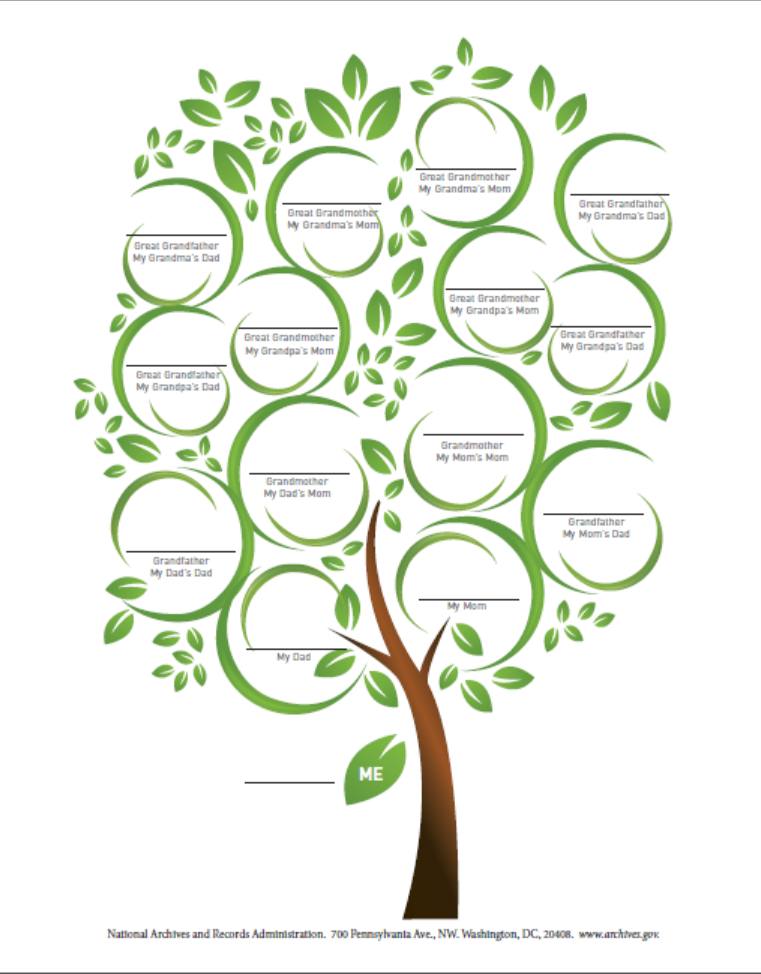 Every year, the National Archives hosts a free, virtual Genealogy event live webcast on YouTube. The sessions offer family history research tools on Federal records for all skill levels. Join thousands of family historians participating during the live event. Attend free of charge and no reservation.
Every year, the National Archives hosts a free, virtual Genealogy event live webcast on YouTube. The sessions offer family history research tools on Federal records for all skill levels. Join thousands of family historians participating during the live event. Attend free of charge and no reservation.